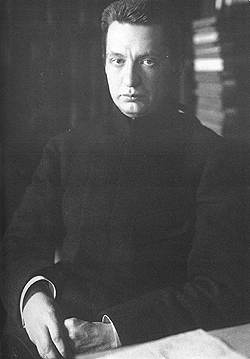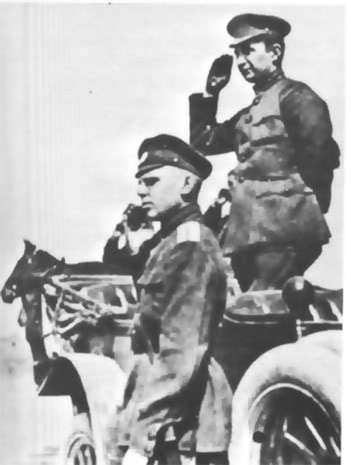
Between the fall of Nicholas II in March 1917 and the rise of Vladimir Lenin in October, Russia’s most significant national leader was Alexander Kerensky. During the eight months of the Provisional Government Kerensky held three important portfolios: justice, war and the prime ministership. A liberal-socialist, popular with the masses and a compelling public speaker, Kerensky was the man who might have saved Russia from political extremism. Instead, his dogged commitment to keeping Russia in the war and his political short-sightedness signed the death warrant of the Provisional Government. In late October 1917, Kerensky was toppled from power and forced to flee Russia, an impotent and defeated figure who had failed to capitalise on the great opportunity passed to him.
After leaving university, Kerensky went into legal practice in St Petersburg. A good amount of his business was representing accused revolutionaries or the victims of police violence. Kerensky also became involved in left-wing political groups, joining the Socialist-Revolutionary (SR) party during the 1905 Revolution. In 1912 he entered public life when he was elected to sit in the fourth Duma, as a member of the Trudoviks (a small but vocal labour faction of the SRs). Kerensky soon rose to prominence as an investigator and an orator. In late 1912 he was sent to Russia’s remote east as part of a Duma committee investigating the Lena River massacre. On his return, Kerensky delivered some sharp criticisms of the government and military. A skilled and articulate orator, he employed similar techniques to those later adopted by Hitler, rehearsing in front of mirrors to fine-tune changes in volume, tone and gesticulation.

By the beginning of 1917, Kerensky was one of the most popular members of the Duma, enjoying a significant working-class following. In March Kerensky was elected vice-chairman of the newly formed Petrograd Soviet, making him the only individual to hold high-ranking positions in both the Soviet and Provisional Government. When members of the Soviet complained about this possible conflict of interest, Kerensky delivered two convincing speeches which argued that links between both bodies was essential; he won the debate. In March he became Minister for Justice, the only socialist to hold a cabinet position in the Provisional Government. As Minister for Justice, Kerensky oversaw the liberalisation of the tsarist legal code: the death penalty was abolished, civil rights were improved, ethnic and religious discriminations were removed. When Lenin returned to April 1917 Kerensky, curious about Lenin’s intentions, attempted to arrange a meeting – but the Bolshevik leader refused.
“Kerensky’s government had fallen, as the Empire had fallen, without a struggle [because] both the emperor and he had been willfully blind to the dangers that threatened them, and both allowed the situation to get beyond their control before taking measures for their own protection. It was only when his hour had already struck… that the emperor consented to grant a constitution. It was the same with Kerensky. He waited and procrastinated. When at last he made up his mind to act, he found that the Bolsheviks had secured the support of the garrison and that it was he, not they, who was to be suppressed. If I had to write the epitaphs of the Empire and Provisional Government, I would do so in two words: lost opportunities.”
George Buchanan, diplomat
Now holding the reins of government, Kerensky’s response to the unrest in Petrograd was firm and immediate. He ordered the arrest of Bolshevik leaders and organisers, while others, including Lenin, were chased into exile. Anti-Bolshevik rhetoric and propaganda began to flow from Kerensky and his supporters in the government. Kerensky also ordered the reintroduction of the death penalty in the military. In August his authority was challenged by the actions of General Lavr Kornilov, whom Kerensky had appointed the commander-in-chief of the army only weeks before. Confronted with the spectre of being ousted by Kornilov and replaced by a military dictatorship, Kerensky was forced to call on the Soviets for support. While this support was not needed, it revealed the weak position of the Provisional Government, which could not command the loyalty of its own generals.

1. Alexander Kerensky was a socialist lawyer, a member of the Duma and anti-government campaigner.
2. In March 1917 he became Minister of Justice, the only socialist in the Provisional Government.
3. Kerensky was later Minister of War, ordering a failed offensive in Austria. He became prime minister in July.
4. In August his authority was challenged by the Kornilov affair, during which he appealed for help from the Soviet.
5. Devoid of power, Kerensky was eventually overthrown by the Bolsheviks during the October Revolution.
© Alpha History 2018. Content on this page may not be republished or distributed without permission. For more information please refer to our Terms of Use.
This page was written by Jennifer Llewellyn, John Rae and Steve Thompson. To reference this page, use the following citation:
J. Llewellyn et al, “Alexander Kerensky” at Alpha History, https://alphahistory.com/russianrevolution/alexander-kerensky/, 2018, accessed [date of last access].
